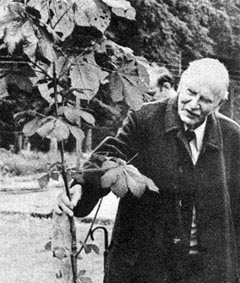I love trees.
My little town had looming, graceful trees on nearly everybody’s front yard. They surrounded the town square where I learned baseball, football, dare-devilry and cloud-watching. I was a boy of the trees: I climbed them, threw and hit balls over, through and around them, and sometimes could get an aching kind of wonder in my chest by just staring at the new greens of spring and the dry riot of fall. I can sometimes see the forest, but I prefer the trees.

He planted his last tree, days before he died, on the USaskatchewan campus where he had first studied forestry.
Richard St. Barbe Baker isn’t well-known anymore, but he should be. The organization he began in Kenya, the Men of the Trees (along with another, the International Tree Foundation), is still active in dozens of countries. Its members are thought to have planted millions of trees. When he began his visionary and dirty-handed activism in 1922, the role of trees in metabolizing atmospheric carbon dioxide and in releasing oxygen was not well understood. However, he recognized before almost anyone else how essential trees were to soil health and stability, the water cycle and in preventing desertification. He once said — or perhaps he said it thousands of times — this:
“Man must resuscitate his planet with trees, his heart with faith.”
Richard St. Barbe Baker (1889-1982) was an environmental activist long before most people even knew what that might mean. Trained in forestry and agriculture, he dedicated his life to planting not only trees but a slow-growing understanding, on several continents, that they gave much more than shade, fruit and fuel.
Poet Roger White knew the “monkish intensity” of the original Man of the Trees and his devotion to them. In a poem called “Notes Toward Survival” in his 1992 collection Occasions of Grace, White remembers how St. Barbe Baker came to Haifa, Israel’s Mt. Carmel to contribute a variety of rare seeds to the project of transforming that desert mount into world-renowned gardens.
“…Man must resuscitate his planet with trees,
his heart with faith. So you simplified
survival’s creed. Your coniferous hope
sealed my discipleship. What Sahara
could resist your passion for verdancy?…”
I love “coniferous hope”. Ever-green hope. Memory must also be a conifer, so I remember, too, the great Woman of the Trees, Kenya’s Wangari Maatthai, the founder of the Greenbelt movement that had thousands of women planting trees to stem and reverse the tide of African desertification. Resuscitation? Faith? The recently departed Ms. Maathai, winner of the 2004 Nobel Peace Prize, put them into eloquent action. It can’t be a mere coincidence that her work with rural women began where St. Barbe Baker had mobilized his Men. I wonder if they met.

I’m sure they have, in the next world. Thanks for reminding us of this remarkable man. Would love to see a documentary on him or some such tribute.